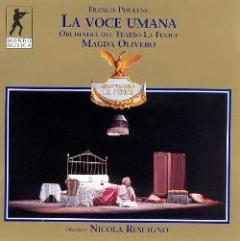Francis Poulenc – La Voix Humanie (La Voce Umana) [1970]
Francis Poulenc – La Voix Humanie (La Voce Umana) [1970]

1. Parte I 2. Parte II 3. Parte III Magda Olivero – soprano
Fenice Theater Orchestra
Nicola Rescigno – conductor
Recording Date 05/03/1970
"Allô, allô..."
It's a crossed line, the other party won't get off the phone and it takes the intervention of the operator to get through to your lover. Sorry, your ex-lover.
This is France in the late 50's. We're eavesdropping as a stylish, sophisticated woman makes a final phone call to the man who kept her as a mistress , but who's now moving on, leaving her alone, distraught, and suicidal. It's agonising: there are interruptions, painful pauses, all the emotional picked up an extension somewhere and were riveted by what we heard), we hear dignity turn to despair and desperation as the woman reveals that she's already tried to kill herself. "If you did not love me and were not so awkward, this telephone could easily become a terrible weapon. A weapon that would leave no marks, nor make a noise..."
Poulenc's La Voix humaine is a telephonic opera, a monologue with more emotional power than many much larger-scale theatre pieces. It demands everything from a performer, and Felicity Lott is one of the very few non-French sopranos who can pull this off on record - her French is flawless. The orchestra and conductor are the other side of the conversation, and Armin Jordan makes it sound as if he knows exactly what's being said at the other end of the line.
Felicity Lott told me recently just how draining La Voix humaine is in performance; a marathon to remember for a start, and it leaves her in tears every time. I very nearly was myself after hearing this cd&listen to it on your own the first time you hear it, as there won't be room for another conversation for a while afterwards.
And the coupling? La Dame de Monte Carlo, a faded courtesan pitching up on the Riviera for a last roll of the dice, a final flutter in her tattered finery, before she hurls herself into the sea. A defiant gesture from one of the "dead among the dead", no longer young and loved and taking the quickest way out of the rest of her life. Beautiful music, strong emotions, poignant performances, and somehow very real drama...but this superb cd really should be sponsored by the Samaritans. ---John Armstrong, bbc.co.uk
Francis Poulenc's one-character opera La Voix humaine (1958), a setting of the homonymous play by Jean Cocteau, explores the psychological complexities of an unnamed woman as she experiences the end of a romantic relationship. During the forty-minute work, she sings in a declamatory manner into a telephone, which serves as a sign of the unrevealed man at the other end. Poulenc uses musical motives to underscore the woman's changing emotional states as she recalls her past relationship. The musical dramaturgy in this work resignifies Debussy's impressionist symbolism by collapsing devices used in Pelléas et Mélisande in a language that shifts between octatonicism, chromaticism, harmonic and melodic whole tone passages, and diatonicism. This late work recontextualizes elements in Poulenc's Dialogues des Carmélites (1953-56), and the end of the opera provides a theme for his Sonate pour Clarinet et Piano(1962), as Poulenc reflects on his youthful encounters with Cocteau, Erik Satie, and Les Six. ---Cynthia C.Beard, digital.library.unt.edu
download: uploaded yandex 4shared mediafire solidfiles mega filecloudio nornar ziddu
Zmieniony (Wtorek, 18 Marzec 2014 14:10)








